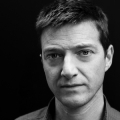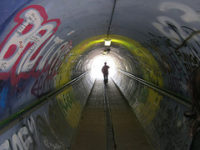You have no items in your cart. Want to get some nice things?
Go shoppingThe first thing I wanted was to travel. Where, why or how didn’t matter. All that mattered was when, and when was always now.
Desire to go beyond what was known: England. Interesting enough, but, as with anything, familiarity breeds contempt.
France was close.
We were always taught to hate the French, the way that, the world over, people are taught to hate the race on the other side of the border, especially if you’ve not met them, or visited their country.
So what did I find when I got to France? People. They walked, breathed and ate. I met intelligent people and stupid people. Mean people and generous people. Bigoted people and tolerant people. The range of types of people seemed the same as at home, divergences mainly being the use of language, food and money.
There were other, subtler differences, but these weren’t evident to a seventeen-year-old after half an hour in Dieppe.
I got onto the motorway and started hitching south. No one stopped. A lorry driver flicked a V. Time slowed down. Traffic stung my throat.
Eventually an old woman stopped in a green Renault. She asked where I was going and I said Cannes or Nice. She laughed. She said would twenty kilometres be enough?
I got into the car. We spoke in slow, fractured French. Her profile was refined; pronounced nose and cheekbone framed against the glass.
We turned into the country. Grey, narrow roads threw a net across the land, on the fields meshed in endless shades of green. I opened my window slightly, breathing in the earth.
The old woman pulled out an egg and pricked it with a pin. She sucked it dry with one hand on the wheel. She asked if I would like to join her. I declined.
A little further south she pulled over and said this was where she turned off.
The landscape changed from green to brown. That’s when I met South African Simon. Nineteen. White. On the run from the army back home.
One stays with the bags while the other runs ahead when the cars stop and asks the driver where they’re going.
Progress still slow.
Vineyards for beds.
Simon said it was a shame that we had no sinsemilla so he stole a bottle of brandy instead.
He handed it to me.
“Journey slow, boy.”
Brandy tickled the back of my throat.
“We’ve no choice.”
“Ah come awn …. you never hot-wired a car?“
I shuddered with the after-burn of brandy.
“No.”
“Jeez, where you been livin’, eh? Back home we learn to hot-wire before we learn to drive.”
He grabbed his bag and stood up. I stayed seated.
“Come awn! You ain’t gonna get far if you can’t hot-wire a car.”
I stood up.
Off a road by a service station, down the side of a bank. Crickets thick in the air. Pink and grey stone underfoot. Some little place somewhere.
“They could be poorer than we are.”
“Come awn!”
“But what about getting caught?”
He said it was night, that we’d get a head start, and to just ditch the car in the morning.
I looked-out while he cut the wires. He worked with a lot of detachment, for someone committing a crime.
“Hey, keep your eyes on the road, boy. Can’t you do nothin’ right?”
The engine ignited and the night got hotter and darker. I looked around.
“Get in the car, boy.”
Pebbles squeaking under rubber. Heartbeat like a clenched fist. The road ahead was a gradual descent, and our speed increased by degrees.
We ditched the car in the morning and slept in the shade till noon. It was easier to sleep knowing we’d covered some distance, and gotten away with our crime.
I was torn up inside. I said I didn’t want to be a car thief. Surely it was worth trying hitching from a lorry depot? Get on a truck going south. At least to give it a go?
He mumbled we could give it a go.
* * *
Lying in a field a few miles from the sea. Space wider than ever before. Stars burning-up in black skies. Palms and vines sprawling on rock. Everything ochre and green. Now we were close. Close to towns with names like Frejus, Cassis and St. Raphael. Names so sweet you could almost taste them. Towns that would provide – we assumed – everything young men wanted.
“What do you say you fetch some water, boy? I’m gonna make a fire.”
We’d found a ten-litre water container in the field. There were some dim, distant lights, and I set out towards them.
The mouth of a tunnel opened up in the rock face. Inside the entrance was a wrecked and rusting car. Shadows twitching on concrete. Graffiti licking the walls. With my intermediate French I could only grasp so much, but the central motif was clear: ‘Jean-Luc Was Here.’
Splashed across the walls were crudely-drawn images of girls, cartoonish spiders in black and red webs … sentences in capitals that I could not translate, but which always ended in exclamation marks.
Further down the tunnel the ground was strewn with broken bottles and the air was damp and still.
When I came out I saw a small house with lights in the windows.
The woman who answered looked alarmed when she saw me. I raised my container and spoke in broken French.
She said there was a standpipe by the side of the house. Flicking her head round she called to her husband.
They walked me to the standpipe.
As the water flowed I felt their eyes upon me. They asked where I was from? Who I was? How old I was? Where I was going? If I was alone?
When the container was full they told me to leave it there, as they had something they wanted to give me. We walked to the door and they invited me in, but I explained that my friend was waiting. The woman went into the house and the man stayed outside. We made small talk. I looked at the sky.
The woman reappeared with a big bag of plums. They were ripe, she explained – only recently ripened.
They said it would be too much to carry the water and plums by myself and that they would help me.
The man carried the water while the woman and I shared the bag’s handles.
Inside the tunnel the air became danker still. Shadows rising and falling. Damp heat caressing my skin. The woman pointed to the graffiti and smiled and started talking so quickly that I could not understand. She looked at me for a recognition that I could not provide. Her husband stared into my face, as if trying to work out how much I understood. Then he started speaking slowly, breaking information down, pointing to the graffiti as he spoke.
I said I think I get it now … Jean-Luc is your … son?
Yes!
So that’s it.
I slowed down and then stopped, still holding one of the bag’s handle. I looked around. Graffiti and drawings covered the walls. A young mind delineated in black and white and red. I looked at the images and texts, imagining their author. I thought him very different to me, but I felt I could still recognise him.
The man and the woman watched me intently, with soft, subdued smiles, saying he was the same age as me, and that I reminded them of him.
There was something else they were trying to explain.
Il est mort l’année dernière.
I conjugated verbs in my head, digging up past tenses from school.
Jean-Luc is … dead?
Yes!
He died last year?
Yes! In a car crash!
He had been eighteen.
They stared at me with fractured smiles; so now you understand?
I looked at them and they looked at me. They suddenly seemed alone.
The woman edged toward me slightly.
Would I like to stay the night? I must be tired after all that travelling, without having slept in a proper bed for weeks.
I politely declined. I was enjoying the adventure, I explained.
But, she continued, there was a room ready and prepared at the top of the house. Clean linen. Scenic views. Croissants and eggs in the morning.
It was a kind offer, I conceded, but one which, unfortunately, I could not accept, as my friend was waiting in the field, making a fire for us.
The soles of the man’s shoes squeaked as he rocked gently on his feet.
Stay with us, he persisted. Just for one night? If you like you can stay longer. But why not stay for one night?
No. I insisted. I had my friend, our journey, the fire that we were making. That was what I wanted.
The man became animated, agitated almost, while the woman seemed to sink into sadness.
“Stay!” they implored.
Suddenly the woman reached a hand out to me; her gesture was effete, desultory even, yet one of her fingers caught my shirt, pulling off a button, and her nail grazed the skin on my chest, drawing a thin line of blood.
I turned to run, still clinging to my handle of the bag of plums. The woman clutched onto her handle tightly, and the bag tore apart at the seam, throwing the plums to the ground. I glanced down at them as I ran: at their newly-ripened flesh slashed on broken glass, their unfermented wine bleeding into dirt. I looked up and ran faster.
Jean Luc’s sentences unwrote themselves as I sprinted back through the tunnel, the images trailing behind like debris. Further up, a short distance from the mouth of the tunnel, the car wreck caught the incoming light, twisting it into the oblique patterns that wavered and dissolved on the walls. I caught a glimpse of the car’s silhouette, and then looked away again, at the small, solitary bulb at the end of the tunnel.
As I came out the atmosphere opened like a pressure valve, sweet and fragrant heat rushing though me, cleansing my senses of the damp, stale scent that had coated my nostrils and throat. The night burst open with limitless space, cricket song peppering the air.
I sprinted along the track, up over the incline, down toward the field that was home. The fire was flickering brightly, licking at the darkness with black and orange tongues. Simon was kneeling beside it, breaking up pieces of wood.
When I reached it I bent over double and placed my hands on knees, breathing roughly and deeply. I closed eyes, watching my inner space swirling.
“Jeez, what happened to the water boy?”
I tried to speak but my breath was too erratic, my tongue too contorted for words.
“Wish I’d ditched you in Paris, boy. You just can’t do nothin’ right.”
I panted and heaved, still facing the ground, waiting to regain the sufficient breath to commence with telling my story.

About Tom Wood
Tom has worked as an arts journalist and as a script writer for TV documentaries. His own work has comprised mainly short stories, which veer toward the satirical, the surreal and the macabre. He won The London Writers' Café section of Issue 7 of Open Pen magazine for his short 'The Three Essential Lessons'. Other projects have included sketches and a full-length play - Mary - which was staged at The Tristan Bates Theatre, London, in 2011. Tom has recently set up a film-production company – Blindly Driven Films – with director Adam Ryzman. Their first short – Relinquished & Volatile – will be unleashed soon.


